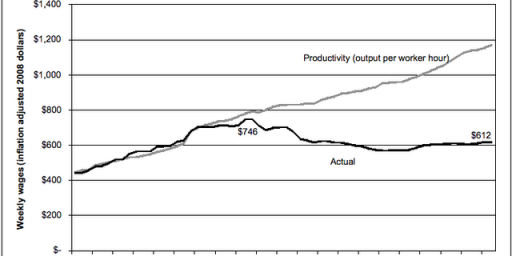Short Work Day Key to Happiness
An Australian researcher says a 4-6 hour work day is the key to happiness.
WORKING four to six hours a day is the key to happiness, according to a new report. In the quest for money and status, Australians are among the hardest workers in the world. But Sydney University academic Dr Caroline West says while work delivers self-esteem, income and social ties, more than four to six hours a day will bring anxiety, exhaustion and a poor quality of life. “We’ve structured our lives so the majority of our waking life is devoted to work, which might bring us more money but doesn’t make us more fulfilled,” Dr West said.
[…]
She said the concept of the four- to six-hour working day — originally flagged by economist John Maynard Keynes in the early 1900s — would even help productivity. But with competitiveness and the quest to “outdo one another” ingrained in society, most people weren’t convinced that working less would make them happier, she said.
Dr West’s research shows most people would rather work longer hours and have more money than have extra leisure and family time. She said people who don’t have money and who don’t value work as their number one priority often risked being ostracised, or dubbed as lazy. “It’s difficult to be someone who places priority on leisure if you’re surrounded by people who just care about money, or care about it more than other things,” Dr West said.
For those of us who live in high traffic areas, even an 8-hour workday is really more like a 10-hour workday. West may be right, empirically. Few people, especially in office enviroments, actually “work” the entire time they’re there, after all, and it’s very difficult to sustain productivity over a long period of time in mentally-intensive work.
Practically, however, I think the workday is apt to get longer, not shorter, as the demands of 24/7 communications get stronger than ever. The best we can likely hope for is more flexible schedules. Many government workers, for example, have the option of working four ten-hour days and taking either Monday or Friday off or working eight-and-a-half hour days and getting a Monday or Friday off on alternate weeks.






I work for myself. While there are some hellacious 12+ hour days a few times a year, my ‘average’ work day is 4 hours. The trade off is the money. Work more hours, get more money, but enjoy life less (at least for me). Even better, get other people working for you so that you get money for every hour they work.
A shorter work day, Forget it.
Most employers are just to dumb to recognize the advantages of it and to damned cheap to even think about it.
You guys sound absolutely French talking about the merits of a short work day.
I think “short work day, with on-site prostitutes provided by employer” definitely merits a controlled study or two.
being presently faced with the sort of all or nothing prospect of retirement, i can certainly see the appeal of this approach. how about just starting the cutbacks at fifty years of age?